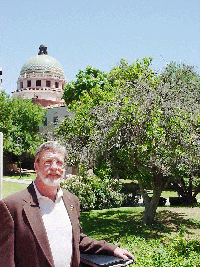While the fighting continues, the battle lines drawn in Tucson by people who talked about the war with the Weekly in 2003 and again last year remain unchanged. Those who initially supported the conflict continue to do so, while those who didn't back the invasion see America sinking into a deeper and more dangerous morass.
"Things are preceding better than expected," claims Bill Heuisler. "Even The New York Times and the Washington Post have admitted that maybe President Bush was right."
"Things are going downhill in Iraq," counters Chris Demchak, professor of public administration and policy at the University of Arizona. "The (recent) election was the same as the end of the colonial period in Africa. After a honeymoon period, Iraq will be torn apart unless there is a redistribution of its oil wealth. It is a caldron waiting to burst as soon as we pull out."
Demchak also believes the idea of turning security responsibilities over to Iraqis isn't going as smoothly as Americans are led to believe. "We don't hear of the kidnappings and killings of Iraqis," she says, "but they have made recruiting difficult." Because of that, she adds, "The best hope for Iraq is a benign dictator, but authoritarian rule there is more likely."
Another factor not receiving attention, Demchak thinks, is the relationship between the cost of the war and federal spending at home. "The Bush administration has succeeded in keeping cuts in social services and the war off the table," she says.
In Demchak's opinion, pressure for American troops to leave Iraq will mount with the approach of the next presidential election. "A lot of people will have to die before we leave," she offers, "or we could retreat in place to safe sites, then quietly depart and say things fell apart after we left. The casualties and our economy will dictate when we pull out."
Heuisler believes differently. "It's not the point when we get out," he insists. "The point is, we are defeating terrorists. We're killing them on the streets in Iraq instead of in Detroit. That will ensure Sept. 11 isn't repeated."
Last year's candidate for county assessor also thinks the recent election in Iraq was a major turning point. "The election shows democracy can work," Heuisler says. "It doesn't matter if religious or secular parties won. The Iraqis no longer have a dictator, and the emancipation of women in Iraq and Afghanistan is immensely important."
Former Tucson mayor and political science professor Tom Volgy takes a less rosy outlook. "The election could bring about the birth of a Islamic Shiite government which isn't secular," he argues, "and whose primary allegiance is to Grand Ayatollah Sistani and Iran. The election might inadvertently end up (resulting in) the kind of government we didn't want."
Another possible casualty of the war, Volgy says, is the future of Iraq as a nation. "There is a question whether there will be one Iraq or three," he suggests. "The Kurds (in the north) want autonomy, and their military is being trained by the Israelis. There may be all kinds of craziness coming out of this very soon."
Volgy isn't hopeful that unfortunate scenario can be avoided. "In the next 12 months, the Iraqis need to do careful negotiations among themselves to keep the state together," he says. "They can't tolerate one-third of the country that controls rich oil fields being autonomous. Unless they have brilliant statesmen, I see great difficulty for the success of the state. If the situation escalates into a civil war," Volgy concludes, "we have no business being there."
From his perspective, Heuisler considers growing world pressure on next door neighbor Syria beneficial, and thinks it might even lead to finding those elusive weapons of mass destruction. "The elimination of Syria as a problem will make a huge difference," he says. "Once Syria is out of Lebanon, the prognosis for the region is wonderful." Then Heuisler adds: "I believe evidence of WMDs could be found in the Bekaa Valley (in Lebanon)."
Caroline Isaacs of the American Friends Service takes the opposite view. She believes the Middle East has been stirred up by U.S. actions, and American interests are based on spreading capitalism, not democracy.
"Our policy is oriented toward public relations and establishing an economic impact," in the area, she says. "We have destabilized the region and are giving insurgents something to insurge against. We're upholding the perception of the West as the aggressor."
While they disagree about almost everything related to Iraq, Heuisler and Isaacs do share the same conclusion about how long U.S. troops will be in the country. They both think America is there to stay permanently.
"I hope we set up some major military bases in Iraq," Heuisler says. "They could protect the tender new democracies (in the region), and that would be a good thing."
"Any discussion of a U.S. pull out after the Iraqi elections has been stifled," says Isaacs. "We're actually building bases there. The United States has no plans to ever get out."







